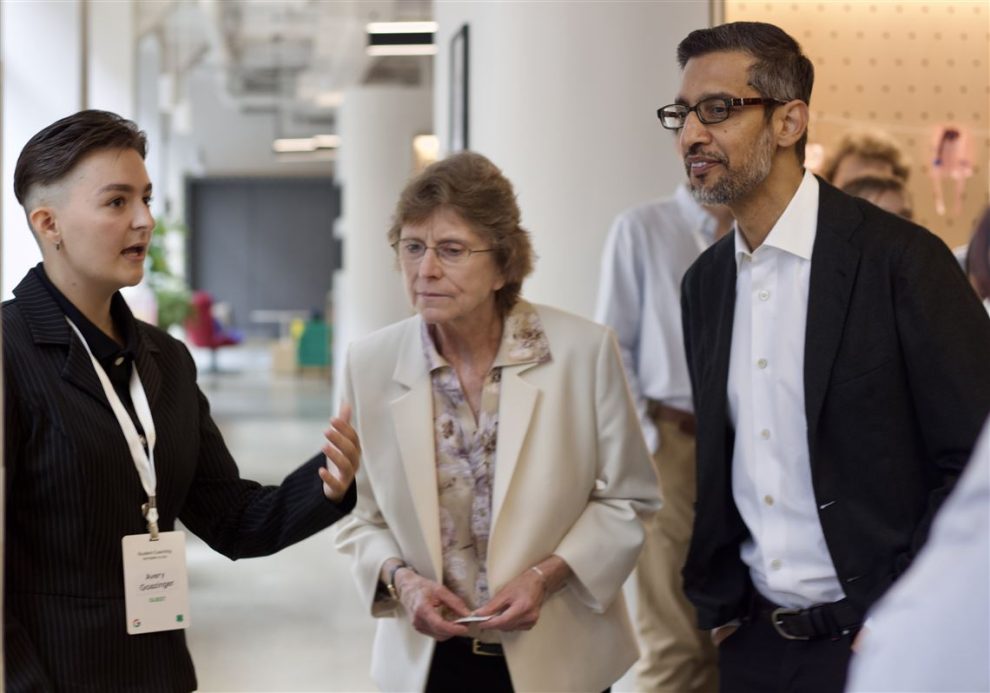Google CEO Sundar Pichai met with local 4-H students, highlighting the tech giant’s commitment to AI education. The visit coincided with Google.org’s announcement of a $250,000 grant to Pennsylvania’s 4-H chapter, part of a larger $25 million national initiative aimed at empowering 500,000 educators and students with AI skills.
As the autumn sun cast a warm glow over Pittsburgh’s tech corridor, an air of excitement filled Google’s local office. Students from Westinghouse Academy and surrounding areas gathered, their nervous energy palpable as they prepared to present their AI projects to one of the tech world’s most influential figures.
Sundar Pichai, making his first visit to Google Pittsburgh since 2017, listened intently as students like Daejour Pinckney shared their innovative ideas. I’m literally sweating buckets right now,” Daejour admitted, moments after shaking hands with the Google CEO.
The collaboration between Google and 4-H marks a significant step in bringing AI education to rural communities. Matthew Crutchman, who oversees Pennsylvania’s 4-H operations, explained the organization’s evolution:
Over the last few years, we’ve really tried to tie any of our projects in 4-H to STEM,” he said, highlighting the shift from traditional agricultural focus to embracing cutting-edge technology.
This partnership aims to leverage 4-H’s extensive network to reach students in rural Pennsylvania, providing them with crucial AI skills for the future job market.
The event showcased a diverse range of student projects, each addressing real-world problems through AI and technology:
1. Daejour Pinckney used AI and robotics to renovate Westinghouse Academy’s dilapidated football practice field.
2. Avery Goazinger focused on the potential mental health impacts of technology.
3. Reed Messer, a self-proclaimed “suburban cowboy,” created a virtual horseback riding experience in the Metaverse.
Google engineers engaged with the students, offering advice and encouragement. Matt Holloway, an engineering manager, emphasized the importance of diverse perspectives in AI development:
“The best system is going to be one that has diverse perspectives,” he told the students. “That’s why it’s always good to team up.”
Google’s $25 Million Commitment to AI Education
The $250,000 grant to Pennsylvania’s 4-H is part of a broader $25 million initiative by Google.org. This national program will support five educational organizations:
1. ISTE
2. 4-H
3. CodePath
4. aiEDU
5. STEM From Dance
Maggie Johnson, global head and vice president of Google.org, expressed her enthusiasm for the program:
“It’s one thing to have a class and learn about digital literacy or AI literacy. It’s another to actually figure out, ‘Well, I have a problem I want to solve. How do I actually take this technology and use it?'”
The choice of Pittsburgh for this event underscores the city’s growing importance in the AI and robotics fields. Valerie Pearce, a Google engineer, reinforced this sentiment to the students:
“If you’re interested in a future in robotics,” she said, “you’re in the right city.”
This initiative aligns with Google’s broader $75 million AI Opportunity Fund, which focuses on local technology training across the country.
As the day drew to a close, the impact of the event was evident. Students left inspired, armed with new knowledge and encouragement from some of the tech industry’s brightest minds. Google’s investment in AI education, particularly in rural areas, promises to shape the future of technology and education in Pennsylvania and beyond.
This initiative not only highlights the importance of AI skills in the modern workforce but also emphasizes the need for diverse perspectives in technology development. As AI continues to evolve, programs like these ensure that the next generation of innovators comes from all backgrounds, ready to tackle the challenges of tomorrow.
















Add Comment